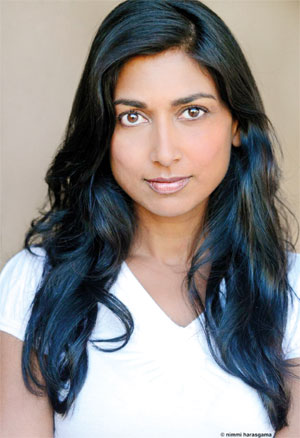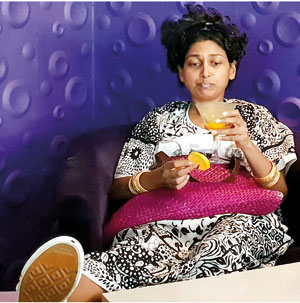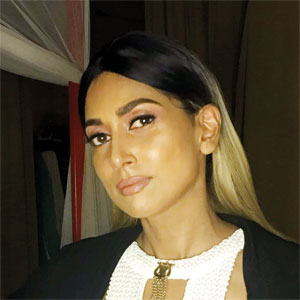‘As Arjie’s Amma I kind of came with the toolbox’

The many faces of Nimmi: As Nalini in Funny Boy (pic courtesy ARRAY), inset, a portrait of Nimmi and below, as Auntie Netta and Brulee Silva
To get into character for Auntie Netta, Nimmi Harasgama compresses her jawline like an accordion to give the illusion of multiple chins. Since her initial appearances over a decade ago, her clothes are now updated to island-appropriate kaftans. Netta’s makeup is chaotically blotted lipstick, which strays out of her lip line. The braided wig has been abandoned for a dishevelled, short wig. When many people meet Nimmi Harasgama in real life, there is an inflection of surprise and a double-take when they connect her to her online alter-ego: “Wait, you’re Aunty Netta?”
At the start of the pandemic, Auntie Netta made a comeback on social media. The videos shot by Nimmi’s husband, are a family affair, deliberately homespun. Netta emerged after years of hibernation to bake a cake with Notta (Nimmi’s son), baila-cize (baila exercise), collaborate with the World Health Organization to encourage social distancing and to make a bra-facemask with her sidekick, Bertha, played by Nimmi’s mother (the verdict: “This is bloody useless. Don’t even think about it.”)
“I have no idea how she turned up again. We were in lockdown. And I wasn’t working and I was like, God, I need to do something and she just popped back. She’s always there. Her little wig is in a box next to my dressing table,” explains Nimmi during a Zoom interview. “She’s one of these characters that seems to cross cultures. And even people who aren’t Sri Lankan and who aren’t brown relate to her so I don’t know what it is about her. But yeah, she turned up during lockdown. She’s gone away now. But she might come back again.”
This irreverence and deployment of comedy as a Trojan horse to explore other themes are characteristic for Nimmi. Both Netta and Nimmi’s most recent online alter-ego, Brulee Silva – a Lankanized caricature of the Valley Girl stereotype – offer ideal outlets for Nimmi to showcase her largely untapped comedy potential on her own terms, outside typecast roles. Brulee as a character is a tongue-firmly-in-cheek exploration of the ubiquitous social media influencer. She speaks with an exaggerated drawl, has a catchphrase, is styled and made-up by a team and while parodying influencers, has unwittingly become an influencer; Brulee collaborates with local social media influencers, promotes locations in Sri Lanka and also does product reviews.

The many faces of Nimmi: As Nalini in Funny Boy (pic courtesy ARRAY), inset, a portrait of Nimmi and below, as Auntie Netta and Brulee Silva
“Even with Brulee, people thought she was a real person. But my whole idea was to explore this type of person on social media, and what that represents and how people react to that. And it’s been an interesting observation for me. So, there’s always a reason behind my madness. Just sometimes I may not discuss it, but there’s always a reason,” reflects Nimmi.
For many Sri Lankans, their first glimpse of Nimmi in a commercial movie was Prasanna Vithanage’s 2003 Ira Madiyama. She’d studied drama and theatre at university and returned to explore the theatre scene while also working at Young Asia Television. Vithanage had heard about Nimmi as a theatre actress and seen her in a telefilm about HIV and AIDS awareness. For Nimmi, working with and learning from Vithanage was a turning point which prompted her to pursue film – until then, theatre was her medium of choice.
 The character Vithanage was casting for, Chamari, was based on a real-life person – a resolute woman who befriends a journalist in her quest to find her missing husband, a Sri Lankan Air Force pilot. Vithanage explains that when he first met Nimmi, he saw the exact modernity, vulnerability, willingness and strength he had envisioned in Chamari’s character. In Ira Madiyama, we see what Vithanage refers to as the “movability of her facial expressions” – an ability to convey a lot with little, without relying on dialogue.
The character Vithanage was casting for, Chamari, was based on a real-life person – a resolute woman who befriends a journalist in her quest to find her missing husband, a Sri Lankan Air Force pilot. Vithanage explains that when he first met Nimmi, he saw the exact modernity, vulnerability, willingness and strength he had envisioned in Chamari’s character. In Ira Madiyama, we see what Vithanage refers to as the “movability of her facial expressions” – an ability to convey a lot with little, without relying on dialogue.
Her recent performance in Funny Boy extends this quality and is a welcome reminder of the range Nimmi is capable of, in a strong role. The movie is based on Shyam Selvadurai’s novel and directed by Deepa Mehta. It takes on a coming of age story of a young Tamil boy grappling with his sexuality, and is set in the backdrop of the violent beginnings of the Sri Lankan civil war. Nimmi as Nalini/Arjie’s mother gives a moving, controlled performance as a mother navigating between the personal and political amidst increasing national uncertainty. We see a strong mother-son bond as well as a Sri Lankan mother trying to balance societal pressures and the love for a son who has long struggled to fit into circumscribed social and gendered roles. As a wealthy Tamil woman, Amma differs from the book a bit, negotiating the tensions between ethnic identity, political ideology and social class.
When Nimmi first read the script for her role, one person came to mind. “There were other elements of the character that yes, of course, I had to prepare for but she reminded me so much of my mother […] I read this script, and I’m like, this is my mom. And so I did look to her. And I also looked to her for the dialogue, because this is our Tamil. This is the Tamil that is spoken by my family,” she says. “It was a very interesting and special moment for me to collude these experiences and to be able to represent a woman like this on film, who belonged so much to my mother’s community.”
For Nimmi, certain scenes in Funny Boy uncomfortably mirrored her memories of the 1983 anti-Tamil pogroms. She was young, but not young enough to forget. There’s a pause in the conversation and her voice catches as she finds the words to describe what she remembers – how her uncle was dragged out of his car and beaten and how an Indian-Tamil family who lived next door came to hide at their place.
 “As children, these are not experiences that you expect to have. Especially when you think about people in the north and the east – these experiences were happening on a regular basis […] what I didn’t realize was that these experiences would help me in this film because there are moments in the film that ran parallel to the experiences that Amma/Nalini had in the film,” she notes.
“As children, these are not experiences that you expect to have. Especially when you think about people in the north and the east – these experiences were happening on a regular basis […] what I didn’t realize was that these experiences would help me in this film because there are moments in the film that ran parallel to the experiences that Amma/Nalini had in the film,” she notes.
There was a particularly jarring, fiction-colliding-with-reality moment while shooting at the Dutch Burgher Union. While filming, she realized that the location overlooked her great-aunt’s house which was destroyed by mobs during the ’83 riots and remembered how her great aunt had to scramble over the wall to escape to her neighbours. “I was like, this is absolutely crazy, because I’m literally in a film that is about what my family experienced and what happened to my family. So as much as you can say that I prepared, I kind of came with the toolbox,” she explained.
The movie’s trailer has elicited divided responses, prompting discussions around casting, representation and language politics. Even as the film is taking on a story that needs to be told, it’s impossible to ignore the critique and our conversation veers towards this. “I think the wider community is assuming that it needs to be this perfect piece. But as much as it is perfect for some people, it is obviously going to be imperfect for others because nothing is perfect. And like a piece of art is interpreted in so many different ways by each individual, this is Deepa (Mehta) and Shyam’s vision. This is their vision. Shyam chose Deepa to direct his story and he had a reason to that. And so I hope that people give this film a chance because there’s such a massive message in there and there’s so many issues that are not being heard. And we have never seen a film like this before. We have never seen a film about the 83 riots,” says Nimmi.
The pandemic has paused parts of Nimmi’s acting life but it’s also given her a chance to spend time with family and get back to reading. But there’s also more projects in the works. She is currently co-writing a screenplay with BAFTA-nominated director Philip John and is a part of a team working on an animated TV series based on the book The Girl Who Stole an Elephant written by British-Muslim Sri Lankan author, Nizrana Farook.
It’s exciting to see a Sri Lankan actress and writer make inroads internationally but it hasn’t been an easy path. Nimmi has exercised a conscious effort to resist the stereotypes that South Asian actors working in the west are slotted into. ‘Brown Girl Panic’, which was recently optioned as a 6-part TV series was deemed too “edgy” and was rejected a year ago. The show is based on one of her 2015 stand-up sets about the immigrant experience, and is a dramedy about Nimmi growing up in England, tracking racism from the 80s to now.
Our conversation finishes on a reflective note – has she ever wanted to give up acting?
“Oh yes, many times. It’s a really hard business. It’s a business and you have to look at it like that. When you’re young, you think it’s all magic and talent but if you pursue it as a career, you have to think of it as your own business. And you have to put in the work every day – even if it’s not acting, it’s going on a computer and networking. I’m on my laptop every day sending emails out to people that I want to work with, coming up with ideas creatively as a writer. It’s nonstop. If you want to do this business, you can’t just want to be an actor and sit at home watching telly. You have to be active. And it is hard. And I have wanted to give up many times.”
Netta’s character, for instance, appeared when Nimmi was sick, incapacitated, stuck at home in England, was on steroids and had put on weight. She had decided to stop acting, had started training to teach English as a foreign language and be a TOEFL teacher when she started doing Netta videos. She began teaching but then started getting work as an actor. Nimmi also reflects on a similar moment where she had contemplated giving up but then a recurring role on the drama series Good Karma Hospital came through.
“You have to keep the faith. In this business, you have to have so much faith in yourself. And equally in this business as actors, you’re also insecure. So it’s a hard dichotomy to live with,” she adds. But equally important is finding joy in what you do. “You have to, always in life, wherever you are, whoever you’re with, or whatever you’re doing, always find a point where you can find happiness in it. Otherwise, there’s no point no, in life?”


